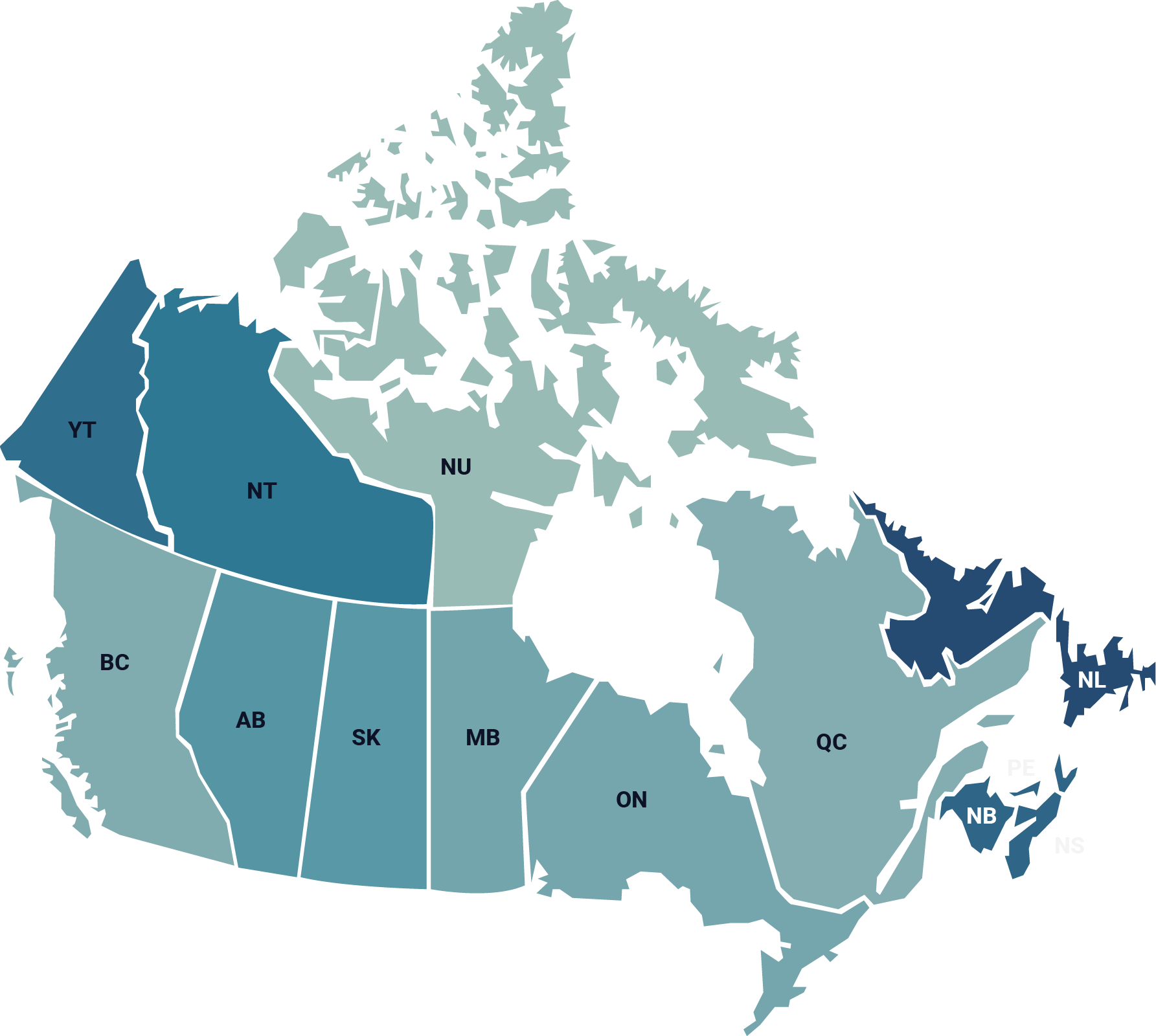Energy Poverty in Canada
Nearly 2 million Canadian households experience energy poverty
This map shows households that face this challenge the most. It highlights areas where more than 6% of income goes towards energy bills.
It gives a clear picture of how energy costs are putting financial strain on families and housing across Canada.
Explore the map to see how widespread this issue is in each province and territory.

27% (113,690)
households are experiencing energy poverty
26% (16,975)
households are experiencing energy poverty
26% (86,380)
households are experiencing energy poverty
31% (69,985)
households are experiencing energy poverty
10% (374,105)
households are experiencing energy poverty
12% (637,810)
households are experiencing energy poverty
12% (61,990)
households are experiencing energy poverty
15% (69,345)
households are experiencing energy poverty
16% (261,750)
households are experiencing energy poverty
10% (211,080)
households are experiencing energy poverty
24% (4,145)
households are experiencing energy poverty
22% (3,355)
households are experiencing energy poverty
7% (700)
households are experiencing energy poverty

%
Alberta
16% (261,750)
households are experiencing energy poverty
%
British Columbia
10% (211,080)
households are experiencing energy poverty
%
Manitoba
12% (61,990)
households are experiencing energy poverty
%
New Brunswick
26% (86,380)
households are experiencing energy poverty
%
Newfoundland and Labrador
26% (69,985)
households are experiencing energy poverty
%
Northwest Territories
22% (3,355)
households are experiencing energy poverty
%
Nova Scotia
27% (113,690)
households are experiencing energy poverty
%
Nunavut
7% (700)
households are experiencing energy poverty
%
Ontario
12% (637,810)
households are experiencing energy poverty
%
Prince Edward Island
26% (16,975)
households are experiencing energy poverty
%
Quebec
10% (374,105)
households are experiencing energy poverty
%
Saskatchewan
15% (69,345)
households are experiencing energy poverty
%
Yukon
24% (4,145)
households are experiencing energy poverty
Energy efficiency improves health and housing for vulnerable communities
Research shows seniors, renters, newcomers, and single-parent families are more likely to struggle with stable housing and health. Challenges in keeping their homes warm or cool can make these problems worse.
Below is a cross-country breakdown of demographics who are more likely to struggle with high energy costs.
This data does not measure energy poverty directly, but those who could be more susceptible to it. Making homes more energy efficient across Canada can prevent energy struggles and make housing and health better, especially for those who need help the most.
8%
of Canadians are newcomers

17%
of Canadians are seniors

30%
of Canadians are renters

17%
of Canadians are single parent households
Improving energy efficiency in housing will make life more affordable for families
Providing energy efficient homes to all Canadians, including private market renters, is critical to address these energy affordability concerns and in reducing emissions to achieve Canada’s climate goals.
The benefits of all Canadians having access to energy efficiency upgrades:
- A proven way to conserve energy and lower energy bills.
- Creates good jobs for Canadians.
- Offers protection from cold and extreme weather events.
- Improves health and housing quality for those struggling to meet their home energy needs.
Policy gaps prevent millions of Canadians from accessing potential energy cost savings through energy efficiency programming:
- Canada does not have a national approach to improving energy efficiency for low-to-moderate income homes.
- Not everyone can cover the upfront costs that existing programs require.
- Private market renters are still excluded from energy efficiency programs.
Majority of Canadians support funding energy efficiency programs for low-income households
The federal government has strong public support for expanding low-income energy efficiency.
According to polling conducted by Abacus Data for Efficiency Canada, 72% of Canadians are in favour of government funding toward energy efficiency for low-income housing.
This support spans across rural and urban populations, owners and renters, all income groups, voters for all political parties and in all regions.
Watch: What is Energy Poverty?
This video provides a clear explanation of what energy poverty is, how Canadians are affected by it, and how energy efficiency can help alleviate challenges presented by energy poverty.
If you like this video, we encourage you to share it with your network.
Canada Home Energy Justice Conference
October 8-9, 2025 | Ottawa, ON
Building a fair and sustainable energy future for all
Research on energy poverty in Canada
Access Efficiency Canada’s research and policy briefs on energy poverty in Canada, in which we explore existing programs for low-income households as well as how to improve energy efficiency in rental units and reduce emissions.
Policy progress on energy poverty in Canada
The fight to end energy poverty is far from over, but significant progress has been made. We’ve tracked some policy milestones that contributed to progress on energy poverty across Canada, including Efficiency Canada’s own work. View the full policy milestones timeline.
-
In a 2019 Federal Budget submission, Efficiency Canada called for a comprehensive energy efficiency strategy to build Canada’s low-carbon future. Part 2 of the 2019 Federal Budget titled “Affordable Electricity Bills and a Clean Economy” outlined plans to reduce energy costs by increasing energy efficiency for Canadians.
-
Efficiency Canada hosted a virtual rally featuring a series of speakers across Canada who shared the challenges of living in energy poverty and working for change. This was part of Efficiency Canada’s larger campaign for energy poverty, which included a sign on letter in support of federal funding for low income energy efficiency programs every year since 2019.
-
Efficiency Canada released the Canada’s Climate Retrofit Mission report, which outlined the scale and performance of building retrofits, and policy actions that are needed to confront the climate emergency. The report also discussed systemic impacts that a large-scale retrofit program could have on health, indoor environmental quality, in reducing poverty, and in creating resilience against climate impacts. Ideas from the report were included in two federal election platforms in 2021.
-
Efficiency Canada published the Efficiency for All report, which detailed how federal investment in provincial low-income energy efficiency programming could help achieve net-zero emissions and reduce energy poverty.
-
Efficiency Canada released the Energy Efficiency in Rental Housing report, which examines how governments can develop public policies to improve energy efficiency while also protecting and enhancing tenant rights. The report outlines challenges and reiterates the importance of improving the energy efficiency of Canada’s private rental stock to reduce emissions and to maintain healthy, comfortable homes for all Canadians.
-
Efficiency Canada released the “Efficiency+ report, which provides policy and program recommendations to unlock Canada’s capacity to alleviate energy poverty, reduce emissions, improve housing quality and achieve better health outcomes for all Canadians, with an emphasis on targeting programs for those who need them the most.

